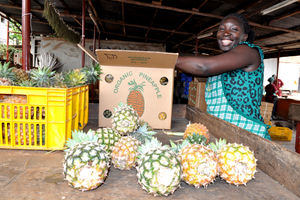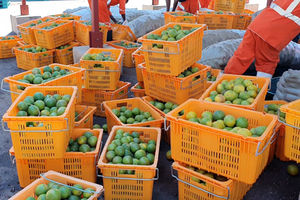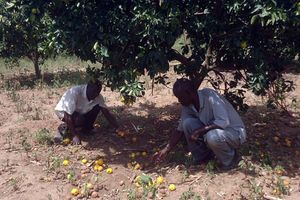
President Museveni commissions Soroti Fruit Factory on April 13, 2019. PHOTO/FILE
In April 2019 when Soroti fruit factory was launched by President Museveni with an objective of providing market for locally grown oranges and mangoes, little did the farmers know that, nearly five years down the road, the challenges of post-harvest losses will continue to be a mainstay of Teso sub-region.
Despite just six metric tonnes processing capacity of fruits per hour, into puree/concentrate and natural ready to drink juice, branded Teju juice, the dreams of thousands of farmers providing the raw material quickly dampened after it became obvious that there are more challenges to deal with than meet the eye.
The price of the fruits quickly took a nosedive as the factory turned out to be too small to accommodate supply from farmers. That then triggered resentment as farmers simply gave up on the factory, paving way for the previous challenges bedevilling the Teso Sub-region economy—massive post handling losses.
In a bid to revitalise operations and expand capacity, Business Outlook understands that the Soroti Fruit Factory has now secured Shs15 billion. The allocation was made available in the current Financial Year (2024/25.) According to the Uganda Development Corporation Executive Director, Dr Patrick Birungi, this allocation is more than what the government development arm has usually been receiving to this cause.
The move comes amidst several concerns from the farmers about the failure of the plant to absorb the local supply, resulting in wastage as well as a more than 60 percent drop in prices of the produce.
“The factory can only process six metric tonnes of oranges or mangoes every six hours, but this can’t happen concurrently because of the current capacity of the plant,” the chairman of Teso Tropical Fruit Growers Cooperative (TEFGCO), Jorem Opian Obion, told Business Outlook.
This works to about 48 metric tonnes per day while operating one shift of eight hours a day. It also means that, at most, the factory can only process slightly in excess of 17,520 tonnes annually yet Teso is estimated to have eight million fruit trees.
Arrested development
Dr Birungi also revealed that a feasibility study also underscored the fact that the fruit production hadn’t been boosted by various government initiatives tailored around distribution of free seedlings.
“Farmers planted those seedlings and there was overproduction. So when the factory came up it was too small to absorb all the supply in the region,” Dr Birungi told Business Outlook.
Moses Kaggwa, the director economic affairs at the Finance ministry, admits that the fruit factory in Soroti “was designed with a low capacity.” He adds that “when the farmers started supplying, there was more supply of the raw materials than what the company could handle.” So what next? Mr Kaggwa says that “going forward we are going through potential discussions with a potential investor who can co-invest to help us expand the capacity of the project.”
In October 2023, Teso Sub-region lawmakers vehemently protested the government’s decision to privatise the Soroti Fruit Factory. They noted that the reason advanced for why the factory is making losses is baseless.
Early this year, during women’s day celebrations, Mr Museveni said that the government will expand the Soroti Fruit Factory so that it operates at the desired capacity
“I have got to know that you’re supplying oranges to Kenya, South Sudan and Rwanda and therefore they supply raw material and yet get paid low prices,” he noted.
Twist
Yet recently, Mr Kenneth Clement Ongalo, the junior Teso Affairs minister, disclosed that the government leased the factory to Ms Mesfin Zenawi, the former First Lady of Ethiopia. Mr Ongalo further revealed that the decision to lease the factory followed negotiations between the Uganda Development Corporation, Attorney General Kiryowa Kiwanuka, and the Solicitor General. In a rejoinder, Mr Kiwanuka said he is not aware of the lease.
Dr Birungi told Business Outlook that “there are ongoing negotiations.” An investor, he added, is “on board.”
“The whole deal will be concluded in a period of three months. We are finalising an operation and maintenance agreements arrangement,” he confirmed.
The Shs15 billion allocation is an additional investment following the initial, US$11.4m (about Shs40 billion) injected into the plant currently operating at a mere 23 percent capacity and struggling to keep up with the supply of raw fruits from local farmers.
Martin Ekomu, the Chief Executive Officer of Soroti Fruits Limited, previously highlighted the need for strategic government intervention to regulate the influx of imported concentrates. Mr Ekomu believes the concentrates undercut local production. This as the factory reportedly banks on imported concentrates from Kenya and South Africa to keep afloat.
“We are requesting that the government imposes taxes on imported concentrate to make them expensive and it will give us a competitive advantage on the market,” Mr Ekomu said during Vice President Jessica Alupo’s visit to the factory.
Dr Birungi, echoed these sentiments, emphasising that while the factory runs below its intended capacity, the issue lies in the mismatch between local productions and processing capabilities.
“We’ve never imported any orange concentrates. We’ve only imported additives and packaging materials. In fact, our challenge is an excess of orange concentrate without an off-take market. We need a tax incentive on concentrate imports because we can’t sell our own, so I can’t ask a tax on concentrate when the one am importing concentrates,” he emphasised.
Meanwhile, the recent Auditor General’s report highlighted the factory’s efforts to improve efficiency and pursue international certifications, such as FSSC 22000, to tap into global markets.







